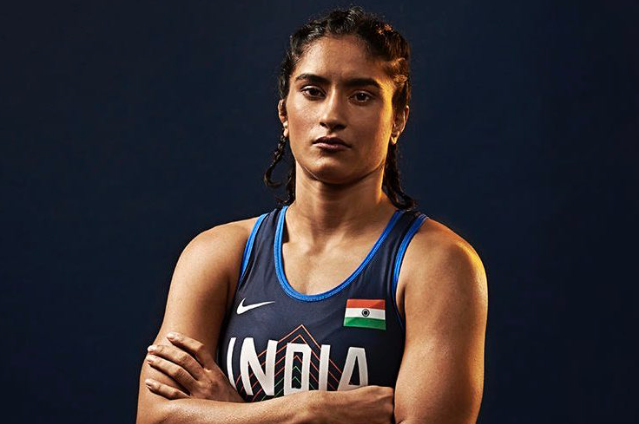Vinesh Phogat, a prominent Indian wrestler has announced her retirement from the sport after facing disqualification in the 50 kg freestyle wrestling final at the Paris Olympics. She shared this news in an emotional post on X (formerly Twitter) on Thursday morning. In her message, Phogat expressed deep sorrow by stating,
"Maa kushti (wrestling) has defeated me; I have lost. I apologize, as both your dreams and my determination have been shattered. I no longer have the strength to continue. Goodbye Wrestling 2001-2024. I will forever be indebted to you all for your forgiveness."
Journey to the Final Match
Phogat had secured her spot in the gold medal match by defeating Cuba's Yusneylis Guzman Lopez with a 5-0 victory in the semi-finals held on Tuesday night. However, she was scheduled to compete against the United States' Sarah Ann Hildebrandt for the gold medal but was disqualified on Wednesday due to a breach of the weight limit.
Initial Reaction to Vinesh Phogat’s Disqualification
Upon learning that Vinesh Phogat has been disqualified, PT Usha expressed her shock and disappointment. She mentioned that she had specifically come to meet Phogat and confirmed that while Phogat is physically and medically fine, she is mentally distressed by the situation. Usha assured that the support staff is diligently working with Phogat, focusing on helping her to lose weight.
Weight Management Concerns
Earlier Dinshaw Pardiwala, the Chief Medical Officer of the Indian Olympic team had disclosed that Phogat was 2.7 kg over the weight limit after her semi-final match. In response, the team tried to manage her weight by limiting her food and water intake. Despite these efforts, Phogat’s weight exceeded the limit that was leading to her disqualification.
Legal Appeal for Silver Medal
Following her disqualification, Phogat took her case to the Court of Arbitration for Sport (CAS). She has formally requested that the court award her the silver medal despite her disqualification. According to a source from the Indian Olympic Association (IOA), the CAS decision is anticipated on Thursday morning. The source confirmed to ANI that Phogat’s appeal specifically seeks the silver medal as a resolution to her disqualification.
The night before an Olympic final, most wrestlers typically recharge after multiple matches by refueling, receiving massages or icing and getting sufficient sleep. However, Vinesh Phogat took an unconventional approach after her semi-final victory. Instead of resting, she engaged in intense activities like skipping rope, cycling and sauna sessions to shed weight and reach the 50kg limit.
Despite her efforts, Vinesh was disqualified for being 100g overweight by making her ineligible for the final. Even if she hadn't been disqualified, her exhausting routine likely left her unprepared for the final.
In a surprising turn of events, Antim Panghal, India's representative in the 53kg category, suffered a crushing 10-0 defeat by Turkey's Zeynep Yetgil in just 101 seconds. Antim, who was considered a strong medal contender, appeared weak and struggled to make her weight, reportedly undergoing a grueling 48-hour starvation period to reach the 53kg limit.
This episode raises concerns about the support staff's competence, particularly in managing wrestlers' weight and preparation. Vinesh Phogat's history of competing in different weight categories from 48kg to 53kg and her unorthodox preparation routine, highlights potential mismanagement.
The incident has sparked questions about the support staff's ability to ensure wrestlers' well-being and optimal performance. The drastic measures taken by Vinesh and Antim to make their weight limits have led to disappointing outcomes, emphasizing the need for reevaluation and improvement in support staff strategies.
Function of the CAS
The Court of Arbitration for Sport (CAS) is primarily responsible for settling legal disputes within the realm of sports through arbitration. This means that it issues decisions known as arbitral awards which carry the same weight and enforceability as the rulings of regular courts. In addition to arbitration, the CAS also offers mediation services. This allows the involved parties to resolve their disputes amicably, provided that the process of mediation is allowed by both sides.
Furthermore, the CAS establishes temporary tribunals specifically for major sporting events like the Olympic Games, Commonwealth Games, and other similar events. These tribunals are governed by special procedural rules tailored to the unique circumstances of each event.
Understanding the Court of Arbitration for Sport
The Court of Arbitration for Sport (CAS) is an international institution founded in 1984 to resolve sports-related disputes through arbitration. Headquartered in Lausanne, Switzerland, the CAS functions independently from any sports organization.
The CAS has the authority to handle disputes involving athletes, coaches, and sports federations. It is widely recognized as the ultimate authority for resolving conflicts in the sports world by ensuring that the principles of fair play and justice are upheld.
In a recent case involving Vineesh Phogat, she has appealed to the CAS for permission to compete for a gold medal. If her request is approved then she has been asked to be granted a joint silver medal. The CAS comprises nearly 300 arbitrators from 87 different countries, all selected for their expertise in arbitration and sports law. Each year, the CAS handles approximately 300 cases.
Understanding the CAS Arbitration Procedure: Filing the Request and Response
The arbitration process at the Court of Arbitration for Sport (CAS) begins when an individual or organization submits an arbitration request or a statement of appeal. Once this initial step is completed, the opposing party that is known as the respondent is required to submit their response to the CAS.
Exchange of Statements and Hearing
Following the submission of these initial documents, both parties may exchange further statements regarding the case. This phase allows both sides to clarify their positions and present additional arguments or evidence. After this exchange, the CAS schedules a hearing where both parties are given the opportunity to present their case in person. During the hearing, they can submit evidence by providing testimonies and present their arguments.
. . .
References:

